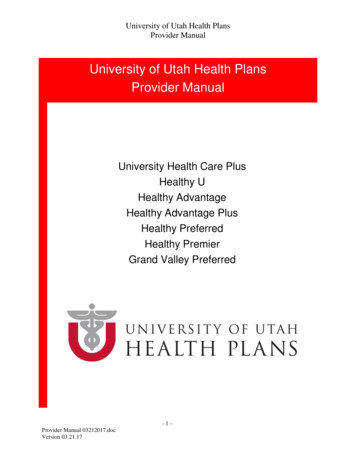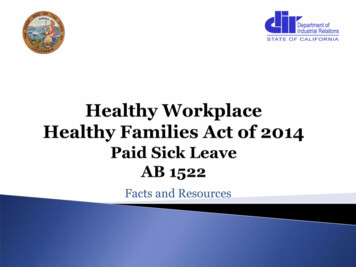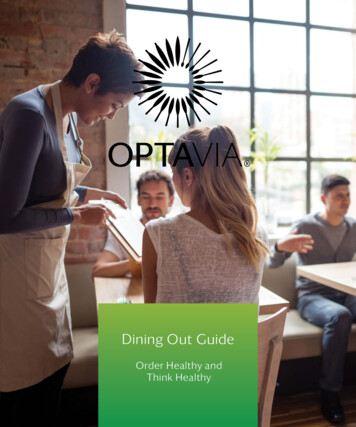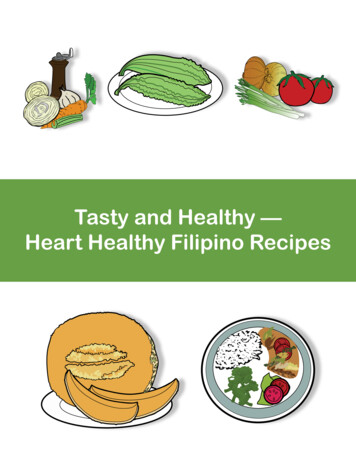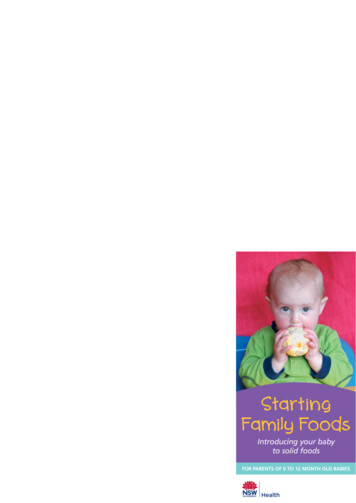
Transcription
Until 12 months cow’s milk shouldonly be used in small amounts tomix with family foods and in cooking. Iron-enriched rice cereal*Minced, stewed or gratedmeat, poultry & liver(cook, freeze then grate)*FishCooked legumes, tofuand tempeh*Cooked vegetables (e.g.carrot, potato, pumpkin)Fruit (e.g. apple, banana,pear, melon)Use small amountsOnly sometimes and in small amountsMilk, yoghurt, cheese and/oralternatives, mostly reduced fatLean meats andpoultry, fish, eggs,tofu, nuts and seedsand legumes/beansFruitChickpeasMixed nuts Cooked egg (yolk & white)Bread, pasta, toast fingersand rusksNut pastes/spreadsFull-fat cheese, custardand yoghurtFirst foods to include:As long as iron-rich foods (*) are included in first foods,foods can be introduced in any order and at a rate thatsuits your baby.LentilsRed kidneybeansRed lentilsChickpeasWheat flakesRed kidneybeansPenneFettuccineQuinoaPolentaGrain (cereal) foods,mostly wholegrainand/or high cerealfibre varietiesMuesliEnjoy a wide variety of nutritious foodsfrom these five food groups every day.Drink plenty of water.Vegetables andlegumes/beansAustralian Guide to Healthy EatingFinger FoodsFamilyfoodsA variety of nutritious foods from the Five Food Groupsis recommended.Mashed/Minced/Finely ChoppedSmall amounts of cooled boiled water may be offeredin a cup.Breastmilk remains an important source of nutrients,immunological support and comfort beyond 6 months.Developmental StageBreastfeeding continues to provide health benefits inyour baby’s second year of life and beyond.Continue breastfeeding for as long as you and yourbaby want to keep going.Continue breastmilk or infant formula.FROM 12 MONTHSAROUND 6 MONTHSFruit juice:Offers no nutritional benefits to babies under12 months. Eating whole fruit is recommended.Cow’s Milk:Is not recommended as baby’s main milk until after12 months. Use breastmilk or infant formula.Milk from other animal sources:Including goat’s and sheep’s milk is not suitable dueto differences in protein and electrolyte levels.Low fat and reduced fat milks:Are not recommended for children under 2 years.After 2 years of age children can drink reduced fatmilks (2-2.5% fat). After 5 years of age childrencan drink low fat milk (e.g. skim milk).Plant-based milks:E.g. soy, rice, oat, coconut, and almond milks arenot an appropriate source of nutrition for babiesunder 12 months. Calcium enriched soy, rice andoat beverages can be used after 12 months if undersupervision by a health professional.Caffeinated and sugar-sweetened drink:Do not offer babies coffee or sugar sweeteneddrinks (e.g. soft drinks, cordials, energy drinks).Developed by Nutrition Services and Central Coast Kids andFamilies, Central Coast Local Health District, in partnershipwith the Australian Breastfeeding Association and mothersof the Central Coast. The information in this leaflet isintended as a general guide for parents of healthy full termbabies. For more copies of this pamphlet contact the BetterHealth Centre Ph (02) 9879 0443, Fax (02) 9879 0994.Revised September 2015SHPN (CPH) 150525ISBN 978-1-76000-298-5 (print)ISBN 978-1-76000-299-2 (online)BIRTH TO AROUND 6 MONTHSDeveloped chewing movementTea:Contains substances which reduce your baby’sability to absorb iron and other essential minerals.Breastmilk or infant formula onlyJaw controlDevelopmental StageIf allergies are a problem in your family seek advice from ahealth professional. The following foods are more commonlyassociated with allergies in babies: milk, eggs, seafood/fish,nuts, tree nuts, sesame, soy and wheat. There is no needto delay introduction of these foods after 6 months.Breastmilk provides adequate fluid up to around6 months.Most children should be eating family foods anddrinking from a cup by 12 months.Nuts:Babies can choke on nuts and similar hard foods. Nutpastes and spreads can be offered from 6 months.Developmental StageBitingChewing developingClearing spoon with lipsInterested in feeding selfThere is no particular order advised for the introductionof solid foods or rate that new foods should be introduced,as long as iron rich foods are introduced first.Can suck and swallow milkStronger suckShows interest in foodBegins chewingCan swallow solidsFrom 12 months full cream cow’s milk can be offeredfrom a cup.Honey:Can have bacteria in it which can cause severe illness(botulism) in infants under 12 months old.Formula fed babies only may need to be offeredcooled boiled water at times of heat stress (such ashot weather or fever).At around 6 months most babies will be able to manage avariety of textures. Some babies will prefer to start with softfoods (mashed or grated) from a spoon and others will preferto start with finger foods such as steak strips and cut up fruit.If you want your baby to grow up on a plant-baseddiet (vegan diet) continue breastfeeding for as long aspossible and consult a dietitian for advice regarding ironand B12 supplementation.8. ALLERGIESSee 1. Why Wait Until Around Six Months before IntroducingSolid Foods?Toddler follow-on milks are not necessary.7. UNSUITABLE FOODS9. FURTHER INFORMATIONFor further information:Early Childhood Health Centres:For centre locations throughout NSW, consult your localwhite/yellow pages or whitepages.com.au under theheading ‘Community Health Centre’ or ‘Early ChildhoodHealth Centre’.Australian Breastfeeding Association (ABA):Breastfeeding Helpline 1800 686 268www.breastfeeding.asn.auTresillian 24-hour Parents Helpline:(02) 9787 0855 or 1300 272 736(freecall outside Sydney metropolitan area)www.tresillian.net/Karitane Care Line:1300 227 464www.karitane.org.auMothersafe. Medications in Pregnancyand Lactation Service:Phone: (02) 9382 6539 or 1800 647 848(freecall outside Sydney metropolitan area)Personal Health Record (known as the ‘Blue Book’):www.health.nsw.gov.auHealthy Kids website:www.healthykids.nsw.gov.auReferences: Infant Feeding Guidelines NHMRC 2012Exclusive Breastfeeding Statement WHO 2011Australian Dietary Guidelines NHMRC 2013Startin gFamily FoodsIntroducing your babyto solid foodsFOR PARENTS OF 0 TO 12 MONTH OLD BABIES
Until 12 months cow’s milk shouldonly be used in small amounts tomix with family foods and in cooking. Iron-enriched rice cereal* Minced, stewed or gratedmeat, poultry & liver(cook, freeze then grate)* Fish Cooked legumes, tofuand tempeh* Cooked vegetables (e.g.carrot, potato, pumpkin) Fruit (e.g. apple, banana,pear, melon) Cooked egg (yolk & white) Bread, pasta, toast fingersand rusks Nut pastes/spreads Full-fat cheese, custardand yoghurtFirst foods to include:As long as iron-rich foods (*) are included in first foods,foods can be introduced in any order and at a rate thatsuits your baby.Use small amountsOnly sometimes and in small amountsMilk, yoghurt, cheese and/oralternatives, mostly reduced fatLean meats andpoultry, fish, eggs,tofu, nuts and seedsand legumes/beansFruitChickpeasMixed nutsLentilsRed kidneybeansRed lentilsChickpeasWheat flakesRed kidneybeansPenneFettuccineQuinoaPolentaGrain (cereal) foods,mostly wholegrainand/or high cerealfibre varietiesMuesliVegetables andlegumes/beansEnjoy a wide variety of nutritious foodsfrom these five food groups every day.Drink plenty of water.Australian Guide to Healthy EatingFinger FoodsFamilyfoodsMashed/Minced/Finely ChoppedA variety of nutritious foods from the Five Food Groupsis recommended.Toddler follow-on milks are not necessary.At around 6 months most babies will be able to manage avariety of textures. Some babies will prefer to start with softfoods (mashed or grated) from a spoon and others will preferto start with finger foods such as steak strips and cut up fruit.Stronger suckShows interest in foodBegins chewingCan swallow solidsBitingChewing developingClearing spoon with lipsInterested in feeding selfDevelopmental StageIf you want your baby to grow up on a plant-baseddiet (vegan diet) continue breastfeeding for as long aspossible and consult a dietitian for advice regarding ironand B12 supplementation.From 12 months full cream cow’s milk can be offeredfrom a cup.Most children should be eating family foods anddrinking from a cup by 12 months.Jaw controlDeveloped chewing movementSmall amounts of cooled boiled water may be offeredin a cup.Continue breastmilk or infant formula.Breastmilk provides adequate fluid up to around6 months.Breastmilk remains an important source of nutrients,immunological support and comfort beyond 6 months.Developmental StageBreastfeeding continues to provide health benefits inyour baby’s second year of life and beyond.Continue breastfeeding for as long as you and yourbaby want to keep going.If allergies are a problem in your family seek advice from ahealth professional. The following foods are more commonlyassociated with allergies in babies: milk, eggs, seafood/fish,nuts, tree nuts, sesame, soy and wheat. There is no needto delay introduction of these foods after 6 months.Nuts:Babies can choke on nuts and similar hard foods. Nutpastes and spreads can be offered from 6 months.There is no particular order advised for the introductionof solid foods or rate that new foods should be introduced,as long as iron rich foods are introduced first.Honey:Can have bacteria in it which can cause severe illness(botulism) in infants under 12 months old.8. ALLERGIES7. UNSUITABLE FOODSAROUND 6 MONTHSFROM 12 MONTHSTea:Contains substances which reduce your baby’sability to absorb iron and other essential minerals.Fruit juice:Offers no nutritional benefits to babies under12 months. Eating whole fruit is recommended.Cow’s Milk:Is not recommended as baby’s main milk until after12 months. Use breastmilk or infant formula.Milk from other animal sources:Including goat’s and sheep’s milk is not suitable dueto differences in protein and electrolyte levels.Low fat and reduced fat milks:Are not recommended for children under 2 years.After 2 years of age children can drink reduced fatmilks (2-2.5% fat). After 5 years of age childrencan drink low fat milk (e.g. skim milk).Plant-based milks:E.g. soy, rice, oat, coconut, and almond milks arenot an appropriate source of nutrition for babiesunder 12 months. Calcium enriched soy, rice andoat beverages can be used after 12 months if undersupervision by a health professional.Caffeinated and sugar-sweetened drink:Do not offer babies coffee or sugar sweeteneddrinks (e.g. soft drinks, cordials, energy drinks).Developed by Nutrition Services and Central Coast Kids andFamilies, Central Coast Local Health District, in partnershipwith the Australian Breastfeeding Association and mothersof the Central Coast. The information in this leaflet isintended as a general guide for parents of healthy full termbabies. For more copies of this pamphlet contact the BetterHealth Centre Ph (02) 9879 0443, Fax (02) 9879 0994.Revised September 2015SHPN (CPH) 150525ISBN 978-1-76000-298-5 (print)See 1. Why Wait Until Around Six Months before IntroducingSolid Foods?Formula fed babies only may need to be offeredcooled boiled water at times of heat stress (such ashot weather or fever).Can suck and swallow milkDevelopmental StageBreastmilk or infant formula onlyBIRTH TO AROUND 6 MONTHS9. FURTHER INFORMATIONFor further information:Early Childhood Health Centres:For centre locations throughout NSW, consult your localwhite/yellow pages or whitepages.com.au under theheading ‘Community Health Centre’ or ‘Early ChildhoodHealth Centre’.Australian Breastfeeding Association (ABA):Breastfeeding Helpline 1800 686 268www.breastfeeding.asn.auTresillian 24-hour Parents Helpline:(02) 9787 0855 or 1300 272 736(freecall outside Sydney metropolitan area)www.tresillian.net/Karitane Care Line:1300 227 464www.karitane.org.auMothersafe. Medications in Pregnancyand Lactation Service:Phone: (02) 9382 6539 or 1800 647 848(freecall outside Sydney metropolitan area)Personal Health Record (known as the ‘Blue Book’):www.health.nsw.gov.auHealthy Kids website:www.healthykids.nsw.gov.auStartin gFamily FoodsIntroducing your babyto solid foodsFOR PARENTS OF 0 TO 12 MONTH OLD BABIESReferences: Infant Feeding Guidelines NHMRC 2012Exclusive Breastfeeding Statement WHO 2011Australian Dietary Guidelines NHMRC 2013ISBN 978-1-76000-299-2 (online)
Until 12 months cow’s milk shouldonly be used in small amounts tomix with family foods and in cooking. Iron-enriched rice cereal* Minced, stewed or gratedmeat, poultry & liver(cook, freeze then grate)* Fish Cooked legumes, tofuand tempeh* Cooked vegetables (e.g.carrot, potato, pumpkin) Fruit (e.g. apple, banana,pear, melon) Cooked egg (yolk & white) Bread, pasta, toast fingersand rusks Nut pastes/spreads Full-fat cheese, custardand yoghurtFirst foods to include:As long as iron-rich foods (*) are included in first foods,foods can be introduced in any order and at a rate thatsuits your baby.Use small amountsOnly sometimes and in small amountsMilk, yoghurt, cheese and/oralternatives, mostly reduced fatLean meats andpoultry, fish, eggs,tofu, nuts and seedsand legumes/beansFruitChickpeasMixed nutsLentilsRed kidneybeansRed lentilsChickpeasWheat flakesRed kidneybeansPenneFettuccineQuinoaPolentaGrain (cereal) foods,mostly wholegrainand/or high cerealfibre varietiesMuesliVegetables andlegumes/beansEnjoy a wide variety of nutritious foodsfrom these five food groups every day.Drink plenty of water.Australian Guide to Healthy EatingFinger FoodsFamilyfoodsMashed/Minced/Finely ChoppedA variety of nutritious foods from the Five Food Groupsis recommended.Toddler follow-on milks are not necessary.At around 6 months most babies will be able to manage avariety of textures. Some babies will prefer to start with softfoods (mashed or grated) from a spoon and others will preferto start with finger foods such as steak strips and cut up fruit.Stronger suckShows interest in foodBegins chewingCan swallow solidsBitingChewing developingClearing spoon with lipsInterested in feeding selfDevelopmental StageIf you want your baby to grow up on a plant-baseddiet (vegan diet) continue breastfeeding for as long aspossible and consult a dietitian for advice regarding ironand B12 supplementation.From 12 months full cream cow’s milk can be offeredfrom a cup.Most children should be eating family foods anddrinking from a cup by 12 months.Jaw controlDeveloped chewing movementSmall amounts of cooled boiled water may be offeredin a cup.Continue breastmilk or infant formula.Breastmilk provides adequate fluid up to around6 months.Breastmilk remains an important source of nutrients,immunological support and comfort beyond 6 months.Developmental StageBreastfeeding continues to provide health benefits inyour baby’s second year of life and beyond.Continue breastfeeding for as long as you and yourbaby want to keep going.If allergies are a problem in your family seek advice from ahealth professional. The following foods are more commonlyassociated with allergies in babies: milk, eggs, seafood/fish,nuts, tree nuts, sesame, soy and wheat. There is no needto delay introduction of these foods after 6 months.Nuts:Babies can choke on nuts and similar hard foods. Nutpastes and spreads can be offered from 6 months.There is no particular order advised for the introductionof solid foods or rate that new foods should be introduced,as long as iron rich foods are introduced first.Honey:Can have bacteria in it which can cause severe illness(botulism) in infants under 12 months old.8. ALLERGIES7. UNSUITABLE FOODSAROUND 6 MONTHSFROM 12 MONTHSTea:Contains substances which reduce your baby’sability to absorb iron and other essential minerals.Fruit juice:Offers no nutritional benefits to babies under12 months. Eating whole fruit is recommended.Cow’s Milk:Is not recommended as baby’s main milk until after12 months. Use breastmilk or infant formula.Milk from other animal sources:Including goat’s and sheep’s milk is not suitable dueto differences in protein and electrolyte levels.Low fat and reduced fat milks:Are not recommended for children under 2 years.After 2 years of age children can drink reduced fatmilks (2-2.5% fat). After 5 years of age childrencan drink low fat milk (e.g. skim milk).Plant-based milks:E.g. soy, rice, oat, coconut, and almond milks arenot an appropriate source of nutrition for babiesunder 12 months. Calcium enriched soy, rice andoat beverages can be used after 12 months if undersupervision by a health professional.Caffeinated and sugar-sweetened drink:Do not offer babies coffee or sugar sweeteneddrinks (e.g. soft drinks, cordials, energy drinks).Developed by Nutrition Services and Central Coast Kids andFamilies, Central Coast Local Health District, in partnershipwith the Australian Breastfeeding Association and mothersof the Central Coast. The information in this leaflet isintended as a general guide for parents of healthy full termbabies. For more copies of this pamphlet contact the BetterHealth Centre Ph (02) 9879 0443, Fax (02) 9879 0994.Revised September 2015SHPN (CPH) 150525ISBN 978-1-76000-298-5 (print)See 1. Why Wait Until Around Six Months before IntroducingSolid Foods?Formula fed babies only may need to be offeredcooled boiled water at times of heat stress (such ashot weather or fever).Can suck and swallow milkDevelopmental StageBreastmilk or infant formula onlyBIRTH TO AROUND 6 MONTHS9. FURTHER INFORMATIONFor further information:Early Childhood Health Centres:For centre locations throughout NSW, consult your localwhite/yellow pages or whitepages.com.au under theheading ‘Community Health Centre’ or ‘Early ChildhoodHealth Centre’.Australian Breastfeeding Association (ABA):Breastfeeding Helpline 1800 686 268www.breastfeeding.asn.auTresillian 24-hour Parents Helpline:(02) 9787 0855 or 1300 272 736(freecall outside Sydney metropolitan area)www.tresillian.net/Karitane Care Line:1300 227 464www.karitane.org.auMothersafe. Medications in Pregnancyand Lactation Service:Phone: (02) 9382 6539 or 1800 647 848(freecall outside Sydney metropolitan area)Personal Health Record (known as the ‘Blue Book’):www.health.nsw.gov.auHealthy Kids website:www.healthykids.nsw.gov.auStartin gFamily FoodsIntroducing your babyto solid foodsFOR PARENTS OF 0 TO 12 MONTH OLD BABIESReferences: Infant Feeding Guidelines NHMRC 2012Exclusive Breastfeeding Statement WHO 2011Australian Dietary Guidelines NHMRC 2013ISBN 978-1-76000-299-2 (online)
Until 12 months cow’s milk shouldonly be used in small amounts tomix with family foods and in cooking. Iron-enriched rice cereal* Minced, stewed or gratedmeat, poultry & liver(cook, freeze then grate)* Fish Cooked legumes, tofuand tempeh* Cooked vegetables (e.g.carrot, potato, pumpkin) Fruit (e.g. apple, banana,pear, melon) Cooked egg (yolk & white) Bread, pasta, toast fingersand rusks Nut pastes/spreads Full-fat cheese, custardand yoghurtFirst foods to include:As long as iron-rich foods (*) are included in first foods,foods can be introduced in any order and at a rate thatsuits your baby.Use small amountsOnly sometimes and in small amountsMilk, yoghurt, cheese and/oralternatives, mostly reduced fatLean meats andpoultry, fish, eggs,tofu, nuts and seedsand legumes/beansFruitChickpeasMixed nutsLentilsRed kidneybeansRed lentilsChickpeasWheat flakesRed kidneybeansPenneFettuccineQuinoaPolentaGrain (cereal) foods,mostly wholegrainand/or high cerealfibre varietiesMuesliVegetables andlegumes/beansEnjoy a wide variety of nutritious foodsfrom these five food groups every day.Drink plenty of water.Australian Guide to Healthy EatingFinger FoodsFamilyfoodsMashed/Minced/Finely ChoppedA variety of nutritious foods from the Five Food Groupsis recommended.Toddler follow-on milks are not necessary.At around 6 months most babies will be able to manage avariety of textures. Some babies will prefer to start with softfoods (mashed or grated) from a spoon and others will preferto start with finger foods such as steak strips and cut up fruit.Stronger suckShows interest in foodBegins chewingCan swallow solidsBitingChewing developingClearing spoon with lipsInterested in feeding selfDevelopmental StageIf you want your baby to grow up on a plant-baseddiet (vegan diet) continue breastfeeding for as long aspossible and consult a dietitian for advice regarding ironand B12 supplementation.From 12 months full cream cow’s milk can be offeredfrom a cup.Most children should be eating family foods anddrinking from a cup by 12 months.Jaw controlDeveloped chewing movementSmall amounts of cooled boiled water may be offeredin a cup.Continue breastmilk or infant formula.Breastmilk provides adequate fluid up to around6 months.Breastmilk remains an important source of nutrients,immunological support and comfort beyond 6 months.Developmental StageBreastfeeding continues to provide health benefits inyour baby’s second year of life and beyond.Continue breastfeeding for as long as you and yourbaby want to keep going.If allergies are a problem in your family seek advice from ahealth professional. The following foods are more commonlyassociated with allergies in babies: milk, eggs, seafood/fish,nuts, tree nuts, sesame, soy and wheat. There is no needto delay introduction of these foods after 6 months.Nuts:Babies can choke on nuts and similar hard foods. Nutpastes and spreads can be offered from 6 months.There is no particular order advised for the introductionof solid foods or rate that new foods should be introduced,as long as iron rich foods are introduced first.Honey:Can have bacteria in it which can cause severe illness(botulism) in infants under 12 months old.8. ALLERGIES7. UNSUITABLE FOODSAROUND 6 MONTHSFROM 12 MONTHSTea:Contains substances which reduce your baby’sability to absorb iron and other essential minerals.Fruit juice:Offers no nutritional benefits to babies under12 months. Eating whole fruit is recommended.Cow’s Milk:Is not recommended as baby’s main milk until after12 months. Use breastmilk or infant formula.Milk from other animal sources:Including goat’s and sheep’s milk is not suitable dueto differences in protein and electrolyte levels.Low fat and reduced fat milks:Are not recommended for children under 2 years.After 2 years of age children can drink reduced fatmilks (2-2.5% fat). After 5 years of age childrencan drink low fat milk (e.g. skim milk).Plant-based milks:E.g. soy, rice, oat, coconut, and almond milks arenot an appropriate source of nutrition for babiesunder 12 months. Calcium enriched soy, rice andoat beverages can be used after 12 months if undersupervision by a health professional.Caffeinated and sugar-sweetened drink:Do not offer babies coffee or sugar sweeteneddrinks (e.g. soft drinks, cordials, energy drinks).Developed by Nutrition Services and Central Coast Kids andFamilies, Central Coast Local Health District, in partnershipwith the Australian Breastfeeding Association and mothersof the Central Coast. The information in this leaflet isintended as a general guide for parents of healthy full termbabies. For more copies of this pamphlet contact the BetterHealth Centre Ph (02) 9879 0443, Fax (02) 9879 0994.Revised September 2015SHPN (CPH) 150525ISBN 978-1-76000-298-5 (print)See 1. Why Wait Until Around Six Months before IntroducingSolid Foods?Formula fed babies only may need to be offeredcooled boiled water at times of heat stress (such ashot weather or fever).Can suck and swallow milkDevelopmental StageBreastmilk or infant formula onlyBIRTH TO AROUND 6 MONTHS9. FURTHER INFORMATIONFor further information:Early Childhood Health Centres:For centre locations throughout NSW, consult your localwhite/yellow pages or whitepages.com.au under theheading ‘Community Health Centre’ or ‘Early ChildhoodHealth Centre’.Australian Breastfeeding Association (ABA):Breastfeeding Helpline 1800 686 268www.breastfeeding.asn.auTresillian 24-hour Parents Helpline:(02) 9787 0855 or 1300 272 736(freecall outside Sydney metropolitan area)www.tresillian.net/Karitane Care Line:1300 227 464www.karitane.org.auMothersafe. Medications in Pregnancyand Lactation Service:Phone: (02) 9382 6539 or 1800 647 848(freecall outside Sydney metropolitan area)Personal Health Record (known as the ‘Blue Book’):www.health.nsw.gov.auHealthy Kids website:www.healthykids.nsw.gov.auStartin gFamily FoodsIntroducing your babyto solid foodsFOR PARENTS OF 0 TO 12 MONTH OLD BABIESReferences: Infant Feeding Guidelines NHMRC 2012Exclusive Breastfeeding Statement WHO 2011Australian Dietary Guidelines NHMRC 2013ISBN 978-1-76000-299-2 (online)
1. WHY WAIT UNTIL AROUND6 MONTHS BEFOREINTRODUCING SOLID FOODS?Both the National Health and Medical Research Council(NHMRC) Infant Feeding Guidelines (2012) and the WorldHealth Organisation (WHO) Exclusive BreastfeedingStatement (2011) recommend introducing solid foodsat around 6 months.There are no benefits to introducing solid foods beforethis time.Introducing solid foods too early can cause problemssuch as: increased risk of food allergies decreased breastmilk production increased exposure to germs2. THINGS TO THINK ABOUT WHENFIRST INTRODUCING SOLID FOODS3. SAFE FOOD HANDLING AND HYGIENEBabies can easily get sick from food poisoning:As long as iron-rich foods are included, first foodscan be introduced in any order and at a rate that suitsyour baby. See ‘Around 6 months’ for information aboutiron-rich foods.Breast or bottle-feed your baby first. Breastmilk or formulais still the most important part of your baby’s diet.At first, solid foods are extras and new tastes for yourbaby.Many babies will only eat a tiny amount to start with(less than ½ teaspoon). Others may want more.Mothers often find that a good time of day to startis when baby is not too tired or too hungry.1. Wash hands with warm running water and soapbefore preparing food for your baby or feedingyour baby.2. Clean food preparation areas before and afterpreparing food. Use clean utensils.3. If preparing formula, sterilise bottles andother equipment.4. Wash fruit and vegetables well-even vegetablesthat are to be peeled and cooked.5. Label and date food to be refrigerated or frozen.Prepared food can be stored in the body of thefridge for up to 48 hours. Hot food can be putstraight into the refrigerator.6. Thaw frozen food in the refrigerator, not onthe bench (at room temperature). Defrost in themicrowave if you are going to use the foodstraight away. increased load on your baby’s kidneys constipation, from poor digestionIf you feel your baby needs to start solids before 6 monthsof age, contact your local Child and Family Health Nurseor General Practitioner. See 9. ‘Further information’.7. Check the temperature of the food by tastingit with a clean spoon. Use another clean spoonto feed your baby. Don’t put your baby’s foodin your mouth then give it to your baby.8. Once food has been warmed and offered to yourbaby, throw out any left in the bowl.9. It is important to realise that ‘off’ food can look,smell and taste OK. So, ‘if in doubt, throw it out’.Eating safelyBabies have very sensitive taste buds at this stage and don’tneed salt, sugar or other flavourings added to their food.Some babies may not like the taste of new foods.They may need to be offered foods many timesbefore they learn to like them.Avoid nutrient poor foods with high levels ofsaturated fat, sugar, or salt (e.g. cakes, biscuits,confectionery and potato chips).4. FINGER FOODSBabies will begin to actively explore their world and thereforethis is a great time to take advantage of their natural interestin food.To help your baby learn to eat family foods, it is importanthe or she practice. Offer an increasing variety of foods,presented in different sizes and textures. Discovering,handling and chewing food assists the development ofsocial skills and promotes the pleasure of eating.Babies enjoy foods that they can pick up with their handsand eat by themselves. Wash your baby’s hands with warmsoapy water first.Suggestions1. Boiled or steamed vegetables – potato, pumpkin, carrotcircles, zucchini strips, beans, peas or slices of beetroot.Hard vegetables need to be well cooked and offered aslarge chunks.2. Raw foods – whole small banana, tomato slices, a smallripe pear, a small whole orange, peeled.3. Cooked lean meat may be cut into strips for chewingor small thin pieces to be picked up with the thumband forefinger. Remember eating needs to be a safe andenjoyable activity. Always remain with your baby while they are eating. Eating is a social occasion. Eating healthy meals together provides the bestexample for your baby.As babies are more likely to choke on food than an adult,it is important: to watch them while they are eating not to let them move around while they are eating to use a safety harness when your baby is in a highchair or low chair to avoid giving them nuts, small hard foods (suchas raw or undercooked pieces of hard fruit andvegetables, popcorn, rice cakes and cocktailfrankfurts) and small slippery foods (such as wholegrapes and whole cherry tomatoes).If using water to mix with baby foods, boil and cool itfirst. After heating food, always mix it thoroughly andtest its temperature before offering it to your baby.6. WHAT ELSE?5. COMMERCIAL BABY FOODSThese can be useful, but:Sleep They are more expensive than home cooked foods.It is common forchildren to wake onceor twice a night eveninto their second year.There is no evidenceto support the ideathat introducing solidsearly will help yourbaby sleep longerat night. They may look, taste and smell different from familyfoods and so don’t help babies learn about the foodsthat the rest of the family eats. When they are used often, babies may become so usedto them that they are reluctant to change to family foods. Regular use of ‘squeezy’ food pouches limits the varietyof food texture and learning about food (look, smelland feel). The regular sucking of food can cause teethto decay and affect speech development.Home prepared food can be just as convenient.Individual food can be cooked, mashed and thenfrozen in ice cube trays.Many food products marketed for babies (e.g. babycustards/yoghurts/pureed fruit) offer no nutr
Including goat’s and sheep’s milk is not suitable due to differences in protein and electrolyte levels. Low fat and reduced fat milks: Are not recommended for children under 2 years. After 2 years of age children can drink reduced fat milks (2-2.5% fat). After 5 years of age children can drink low fat milk
